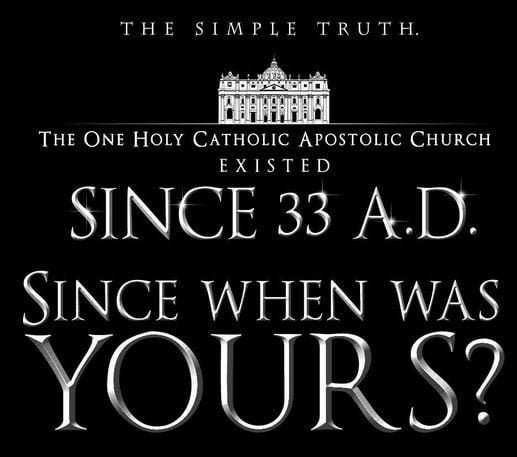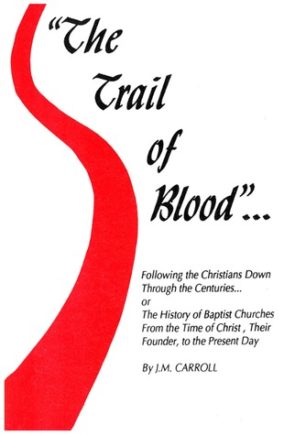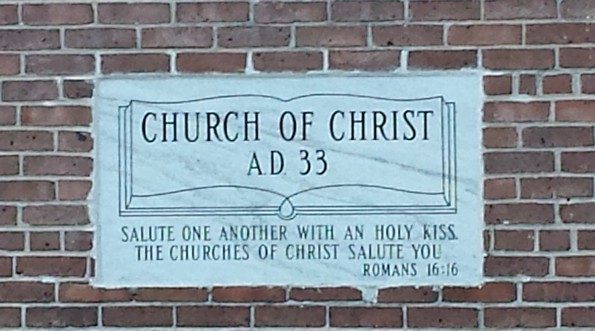
The Churches of Christ, along with the Baptists and the Roman Catholic Church, consider themselves to be the one true church of Jesus Christ. According to catholic365.com, there are five reasons the Roman Catholic Church is the true church:
1. Authority- Jesus gave specific instructions regarding dealing with members of the Church who were in sin. Matthew 18:15-18 says “If your brother sins against you, go and tell him his fault between you and him alone. If he listens to you, you have won over your brother. If he does not listen, take one or two others along with you, so that ‘every fact may be established on the testimony of two or three witnesses.’ If he refuses to listen to them, tell the church. If he refuses to listen even to the church, then treat him as you would a Gentile or a tax collector. Amen, I say to you, whatever you bind on earth shall be bound in heaven, and whatever you loose on earth shall be loosed in heaven.” What Evangelical/Protestant Church has the authority to remove someone completely from the church? None. If an individual is removed from a ‘congregation’ then he/she can go down the street and join another ‘congregation’ of the same denomination. The congregations are individualized and have no authority outside their own denomination. That is not true with the Catholic Church. If removed from the Catholic Church, one cannot go to another city and join another Catholic Parish.
2. History- The Roman Catholic Church is the oldest and original Christian Church, therefore, the beliefs and teachings of the Church were directly passed onto the leaders of the Catholic Church by the apostles. The Catholic Church began with the teachings of Jesus Christ, around 1st Century AD in the province of Judea of the Roman Empire. The Catholic Church is the continuation of the early Christian community established by Jesus and no modern Christian Church can make that claim. By the end of the 2nd century, bishops began congregating in regional synods and to correct doctrinal and policy issues and by the time the 3rd century came around, the Bishop of Rome (Pope) served as the decisive authority, kind of like a court of appeals, for problems and issues the bishops could not resolve. This is identical to the Bible’s teaching. In Exodus 18 we see where the children of Israel brought their disputes to Moses and Moses settled those disputes. However, it also shows where leaders appointed by Moses also worked to settle disputes.
The Catholic Church remained the only Christian Church until the East-West Schism of 1054, which caused medieval Christianity to split and become two separate branches. The greatest division, however, came during the Reformation from 1517-1648, led by Martin Luther. The East-West (Great) Schism was caused by Patriarch Michael I. According to Titus 3:9-11, the divisions led by Patriarch Michael I and Martin Luther were sin. “Avoid foolish arguments, genealogies, rivalries, and quarrels about the law, for they are useless and futile. After a first and second warning, break off contact with a heretic, realizing that such a person is perverted and sinful and stands self-condemned..”
3. The Catholic Church gave Christians the Bible- The first official list of books contained is what is the Bible was done at the Council of Hippo in 393 and then again in Carthage in 397 and 419. However, the Council of Trent in 1556 was the first time the Church infallibly defined these books as ‘inspired’ because it was questioned by Reformers. We have to admit, the apostles did not walk around with nice leather bound Bibles in their hand. There are many parts of the Bible that are oral tradition which was written down because when early believers attended the Synagogue or church, the scripture was read. They did not have their own copy with their name engraved on the front. Oral tradition was the norm of practice long before writing and reading was a part of life. The Jews followed the Old Testament before Jesus was born and Jesus is pictured in Scripture reading from the Old Testament in the Synagogue. There were multiple writings from this time but it was only after the list of books determined to be the ‘inspired Word of God’ by the Catholic Church first with the Council of Hippo in 393 that the world had what is called “The Bible”. The Bible remained the original 73 books determined by the Catholic Church until the Reformation, when Martin Luther threw out 7 books of the Old Testament that disagreed with his personal view of theology…the same Old Testament adhered to by the Jews. He threw these 6 books out in the 16th Century. Luther also attempted to throw out New Testament books James, Hebrews, Jude and Revelation. In referring to James, he said he wanted to ‘throw Jimmy into the fire’ and the book of James was ‘an epistle of straw’ with no usefulness. After Pope Damasus I approved the 27 New Testament Books however in 382 AD, Luther agreed with the Pope and accepted the New Testament books but denied the Old Testament books …which remained out of his Bible. Non-Catholics will accept the Biblical books which are contained in the Protestant Bible but do not acknowledge they are accepting and trusting the authority of the Catholic Church because the Catholic Church was the one who proclaimed the entire list, as a whole, as ‘inspired’. The letters within the Bible are not the only letters and materials written by the Apostles so, as a result, those contained within the Bible had to be declared ‘inspired’ and it was the Catholic Church which did that duty.
4. The Sacraments are Biblical- The Apostles were given the power to ‘forgive sins’ in John 20:23, Peter taught in I Peter 3:21 that ‘baptism now saves you’, ‘anointing the sick with oil was shown in James 5:14-15, laying on of hands in Acts 8:17 and 2 Timothy 1:6, marriage in the Lord in I Corinthians 7:39 and Jesus stated numerous times that the disciples should participate in the breaking of bread (Eucharist) by stating ‘he who eats my flesh has eternal life’.
5. Sola Scriptura is not supported in the Bible- It is difficult to make a claim such as Sola Scriptura (The Bible Alone) when, in its very essence, the claim must be written within the Bible in order to be Biblical. The concept of “Bible Alone” says it is not truth if it is not contained in the Bible, therefore removing ‘tradition’, but the Bible refutes that principle. Jeremiah 25:3 says the “Word of the Lord” is “spoken”, not just written. Paul told us to hold to our traditions, which are taught by word and mouth or by letter, according to 2 Thess 2:15. The Bible also portrays where a Council was held to settle doctrinal disputes in Acts 15. (Who else has a Council to settle doctrine disputes and holds the authority to do such other than the Catholic Church?) The Bible also warns about ‘twisted’ interpretations of Scripture in 2 Peter 3:16 and I Timothy 3:15 says THE CHURCH is the pillar and the bulwark of the truth. The Catholic Church has one teaching…one unified teaching…as opposed to the now 43,000 evangelical (Protestant) groups currently established, with 2.3 added each day. Their views on everything from the Trinity, homosexuality, abortion, and salvation all contradict each other. Truth cannot be false at the same time and Truth cannot contradict each other.

Many Baptist churches also consider themselves to be the one true church. These Baptists believe that they can trace their lineage all the way back to Jesus and his apostles. In 1931, Baptist pastor J.M. Carroll published a booklet titled The Trail of Blood. This booklet detailed what is commonly called Landmarkism or Baptist Successionism — the belief that some Baptist churches are the one true church founded by Jesus Christ. Carroll gave ten infallible marks of a true church:
1. Christ, the author of this religion, organized His followers or disciples into a Church. And the disciples were to organize other churches as this religion spread and other disciples were “made.”
2. This organization or church, according to the Scriptures and according to the practice of the Apostles and early churches, was given two kinds of officers and only two–pastors and deacons. The pastor was called “Bishop.” Both pastor and deacons to be selected by the church and to be servants of the church.
3. The churches in their government and discipline to be entirely separate and independent of each other, Jerusalem to have no authority over Antioch–nor Antioch over Ephesus; nor Ephesus over Corinth, and so forth. And their government to be congregational, democratic. A government of the people, by the people, and for the people.
4. To the church were given two ordinances and only two, Baptism and the Lord’s Supper. These to be perpetual and memorial.
5. Only the “saved” were to be received as members of the church (Acts 2:47). These saved ones to be saved by grace alone without any works of the law (Eph, 2:5, 8, 9). These saved ones and they only, to be immersed in the name of the Father, Son and Holy Spirit (Matt. 28:19). And only those thus received and baptized, to partake of the Lord’s Supper, and the supper to be celebrated only by the church, in church capacity.
6. The inspired scriptures, and they only, in fact, the New Testament and that only, to be the rule and guide of faith and life, not only for the church as an organization, but for each individual member of that organization.
7. Christ Jesus, the founder of this organization and the savior of its members, to be their only priest and king, their only Lord and Lawgiver, and the only head of the churches. The churches to be executive only in carrying out their Lord’s will and completed laws, never legislative, to amend or abrogate old laws or to make new ones.
8. This religion of Christ to be individual, personal, and purely voluntary or through persuasion. No physical or governmental compulsion. A matter of distinct individual and personal choice. “Choose you” is the scriptural injunction. It could be neither accepted nor rejected nor lived by proxy nor under compulsion.
9. Mark well! That neither Christ nor His apostles, ever gave to His followers, what is known today as a denominational name, such as “Catholic,” “Lutheran,” “Presbyterian,” “Episcopal,” and so forth–unless the name given by Christ to John was intended for such, “The Baptist,” “John the Baptist” (Matt. 11:11 and 10 or 12 other times.) Christ called the individual follower “disciple.” Two or more were called “disciples.” The organization of disciples, whether at Jerusalem or Antioch or elsewhere, was called Church. If more than one of these separate organizations were referred to, they were called Churches. The word church in the singular was never used when referring to more than one of these organizations. Nor even when referring to them all.
10. I venture to give one more distinguishing mark. We will call it–Complete separation of Church and State. No combination, no mixture of this spiritual religion with a temporal power. “Religious Liberty,” for everybody.
In the 19th century men such as Barton Stone, Thomas Campbell, and Alexander Campbell took it upon themselves to restore Christian churches to their First Century Apostolic purity. Firmly rooted in Baptist soil, the Restoration movement caused numerous fractures and splits, leading to the establishment of groups such as the Churches of Christ and Christian Church (Disciples of Christ). While Landmark Baptists and Churches of Christ have similar doctrinal beliefs, neither considers the other part of the true church. These two groups have spent much of the last 160 years fighting over whether baptism is required for salvation. Put a Church of Christ evangelist in the same room with a Baptist elder and they will spend their time together arguing over the Greek word eis (for) in Acts 2:38:
Then Peter said unto them, Repent, and be baptized every one of you in the name of Jesus Christ for the remission of sins, and ye shall receive the gift of the Holy Ghost.
The evangelist will argue that the word for means that a sinner must be baptized in order to have their sins to be remitted. The elder argues that the word for means because of. Christians are baptized, not to have their sins remitted, but because their sins have already been washed away.

Al Shannon is a Churches of Christ preacher who displays his theological prowess on the Biblical Proof website. In a May 20, 2016 post titled Are There Any Christians in Denominational Churches?, Shannon makes sure his readers understand that the only true Christians are those who are a member of a Churches of Christ congregation. Shannon writes:
Are there good people in all denominational churches? Are there any Christians once named among them? It’s a fundamental question because denominations profess to be Christians, yet they deny what it requires to become a Christian.
Most Christians understand that when someone obeys the gospel (Rom. 6:17) the Lord adds him to His church (Acts 2:47), of which is the only blood-bought (Acts 20:28) institution the Bible speaks. This is the “church” which Christ built (Mt 16:18).
The Bible speaks often of the Great Apostasy (2 Thess. 2:3-4 f; 2 Tim. 4:3-4). This manifested itself in Roman Catholicism, from which every denomination in the world today sprang (Rev. 17:5). Error truly does begat error.
The Bible also speaks of (and condemns) sectarianism and division, which is what denominationalism really is, as each term stands firmly against the Bible-based unity declared in Ephesians 4:4.
In Galatians 5:19-21, Paul lists “factions, parties, and divisions” as being “works of the flesh,” and warned all men everywhere and for all time that “they who practice such things shall not inherit the kingdom of God.”
In trying to understand why there are no Christians in any denomination, let us consider three points. First, there was division at Corinth. Just a mere six years after the Corinthian church was planted some of these brethren had developed a sectarian spirit. In 1 Corinthians 1:11 Paul begs his brothers in Christ there to free themselves from all contentions.
….
Secondly, the overwhelming bulk of the denominations in the world today subscribe to most of the views of John Calvin, in particular the false doctrine of “faith only” (that they are saved at the point of belief, separate and apart from further obedience, regardless of what John 3:5 may say).
Therefore, those in the denominations have never obeyed the gospel. They have deceived themselves into believing a lie (2 Thess. 2:11-12), and will, therefore, be destroyed at the Lord’s coming (2 Thess. 1:7-9).
….
Finally, New Testament Christians must be careful not to make man-made laws for our brethren (as some sought to do in Acts 15:1-2). When such happens, a sectarian spirit will develop and will result in something other than New Testament Christianity (Psa. 127:1).
Based on what I have shared above, the Catholics, Baptists, and the Churches of Christ all claim to be the one true church of Jesus Christ. What makes things even more difficult is that there are numerous other groups that claim they are the one true church. How are people supposed to know which sect is the one true church? The Catholics, Baptists, and Churches of Christ all point to the Bible (and history) as proof for their true church declaration. In Ephesians 4:5,6 the Apostle Paul wrote:
One Lord, one faith, one baptism, One God and Father of all, who is above all, and through all, and in you all.
Paul seems to be saying that there is only one true church. While Protestants will say (Baptists and Churches of Christ do not consider themselves Protestants) the one true church is comprised of the true Christians found in the various Christian sects, the Churches of Christ and many Baptists reject what is commonly called the Universal Church or the Invisible Church. They believe that the only church is local churches, each an independent franchise of the One True Church Club®.
So what are sinners to do? Which church is the one true church? How can anyone know whether any sect is the one established by Jesus and the Apostles? You’d think Jesus would come down from Heaven and make clear which group is his Church®. Better yet, why not rain fire down from the skies and destroy every church that is not a part of the One True Church Club®. Surely unbelievers can’t be expected to figure out which church is the right one. Come on God, help us out.
Bruce Gerencser, 68, lives in rural Northwest Ohio with his wife of 47 years. He and his wife have six grown children and sixteen grandchildren. Bruce pastored Evangelical churches for twenty-five years in Ohio, Texas, and Michigan. Bruce left the ministry in 2005, and in 2008 he left Christianity. Bruce is now a humanist and an atheist.
Your comments are welcome and appreciated. All first-time comments are moderated. Please read the commenting rules before commenting.
You can email Bruce via the Contact Form.
